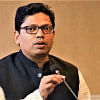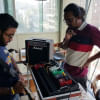Bitcoin creator reveals identity

Australian entrepreneur Craig Wright has publicly identified himself as Bitcoin creator Satoshi Nakamoto.
His admission follows years of speculation about who came up with the original ideas underlying the digital cash system.
Wright has provided technical proof to back up his claim using coins known to be owned by Bitcoin's creator.
Prominent members of the Bitcoin community and its core development team say they have confirmed his claims.
But many others in the Bitcoin world are asking for more proof.
Signed blocks
Wright has revealed his identity to three media organisations - the BBC, the Economist and GQ.
At the meeting with the BBC, Wright digitally signed messages using cryptographic keys created during the early days of Bitcoin's development. The keys are inextricably linked to blocks of bitcoins known to have been created or "mined" by Satoshi Nakamoto.
"These are the blocks used to send 10 bitcoins to Hal Finney in January [2009] as the first bitcoin transaction," said Wright during his demonstration.
Renowned cryptographer Hal Finney was one of the engineers who helped turn Wright's ideas into the Bitcoin protocol, he said.
"I was the main part of it, but other people helped me," he said.
Soon after Wright went public, Gavin Andresen, chief scientist at the Bitcoin Foundation, published a blog backing his claim.
"I believe Craig Steven Wright is the person who invented Bitcoin," he wrote.
Jon Matonis, an economist and one of the founding directors of the Bitcoin Foundation, said he was convinced that Wright was who he claimed to be.
"During the London proof sessions, I had the opportunity to review the relevant data along three distinct lines: cryptographic, social, and technical," he said.
"It is my firm belief that Craig Wright satisfies all three categories."
Wright said he planned to release information that would allow others to cryptographically verify that he is Satoshi Nakamoto.
Not everyone has been convinced by Wright's claims and the technical proof he put in his blog. Some cryptographers and developers who worked through the information provided said they had trouble getting verifiable information out of it.
Security expert Dan Kaminsky said the procedure was almost "maliciously resistant" to validation.
Many people have called on Wright to go further in proving his identify.
'I want to work'
By going public, Wright hopes to put an end to press speculation about the identity of Satoshi Nakamoto. The New Yorker, Fast Company, Newsweek and many other media organisations have all conducted long investigations seeking Bitcoin's creator and named many different people as candidates.
In December 2015, two magazines, Wired and Gizmodo, named Mr Wright as a candidate after receiving documents believed to be stolen from him that revealed his involvement with the project.
Soon after these stories were published, authorities in Australia raided the home of Wright. The Australian Taxation Office said the raid was linked to a long-running investigation into tax payments rather than Bitcoin.
Questioned about this raid, Wright said he was cooperating fully with the ATO.
"We have lawyers negotiating with them over how much I have to pay," he said.
The stories in December have led to many more journalists and others pursuing him and people he knows, he said.
"There are lots of stories out there that have been made up and I don't like it hurting those people I care about," he said. "I don't want any of them to be impacted by this."
"I have not done this because it is what I wanted. It's not because of my choice," he said, adding that he had no plans to become the figurehead for bitcoins.
"I really do not want to be the public face of anything," he said, expressing regret that he had been forced to reveal his identity.
"I would rather not do it," he said. "I want to work, I want to keep doing what I want to do. I don't want money. I don't want fame. I don't want adoration. I just want to be left alone."
Bitcoins are now accepted as payment for a vast variety of goods and services - everything from international money transfers to ransoms for data encrypted by computer viruses. There are currently about 15.5 million bitcoins in circulation. Each one is worth about $449 (£306).
Satoshi Nakamoto is believed to have amassed about one million Bitcoins which would give him a net worth, if all were converted to cash, of about $450m.

 For all latest news, follow The Daily Star's Google News channel.
For all latest news, follow The Daily Star's Google News channel. 








Comments